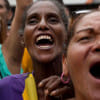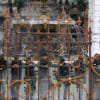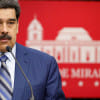Venezuela’s experience with democracy

As Nicolas Maduro secured a third term in Venezuela in July 2024, despite claims and evidence that the opposition leader won, Freddy Guevara, former vice-president of the Venezuelan Parliament and a key opposition voice against Maduro's dictatorship, speaks with Sarzah Yeasmin, contributor to Geopolitical Insights, in an exclusive interview sharing why the nation could not successfully transition to a democracy.
In 2019, Venezuela's interim government was formed by the national assembly to restore democracy and challenge the government of Nicolas Maduro—the successor of Hugo Chavez—who was accused of committing election fraud by Juan Guaidó, who declared himself the interim leader. It was a "double state situation" as Maduro was still in power. The interim government's main mandate was to bring down Maduro and restore democracy, but it was only a constitutional and political tool without the power to fully govern. The constitutional framework of Venezuela allows for the interim government to exist for transitional leadership, but its application can be contentious and politically charged. In 2022, the interim government was dissolved. Before that, in 2021, Freddy Guevara—who was voted top Congressman in the country in 2015 and who co-founded the Venezuelan progressive party Voluntad Popular—was arrested for his years of leadership in the country's democratic movement and kept in solitary confinement. After spending three years in hiding, at the Chilean embassy in Caracas, the capital of Venezuela, and enduring rounds of arrests, Guevara had to leave his country. Yet, to this day, Guevara continues to be one of the most prominent voices against Venezuela's dictatorship, working tirelessly to advocate for democracy both at home and abroad.
By late 2022, why did the popularity of the interim government decline and what were the forces at play?
The Venezuelan interim government operated under a unique set of challenges. It gained popularity in Venezuela for several reasons: many Venezuelans were frustrated with Maduro's government, which faced allegations of corruption, economic mismanagement, and human rights abuses. Guaidó represented a potential alternative. There was initial international support: the interim government received backing from the United States and many Latin American nations, which added legitimacy to Guaidó's claim. But as it was formed while Maduro was still in power, the interim government never had full control of the country's institutions.
Over time, two major issues led to the interim government's downfall. First, every year that we failed to oust Maduro, the interim government had to extend its mandate. As the next presidential election approached, political leaders became concerned that Guaidó was using his position to prolong his stay in power, potentially to run for president himself. This fear was one of the key reasons for the dissolution. Second, there were accusations of corruption within the interim government, which created distrust and were amplified by the Maduro regime and internal opposition forces.
It's important to note that the forces at play included both authoritarian influences and internal opposition struggles. These dynamics ultimately caused the collapse of the interim government and underscored the importance of unity and transparency in fragile political transitions. The combination of unmet expectations, internal conflicts, and external pressures led to the loss of popular support for the interim government, even though most Venezuelans still wanted Maduro out.
What marked the tipping point of a democratic and thriving Venezuela into a dictatorship?
We can look at examples from various countries: Venezuela, Tunisia, Bolivia, Nicaragua, and Egypt. These nations experienced a democratic transition but later reverted to authoritarian rule. While the specifics differ, there are common trends. First, the role of security forces is critical. In many countries, if the armed forces are not committed to the rule of law and democratic governance, they become accomplices to authoritarianism. So it's essential to cultivate a democratic culture within security institutions.
Second, the independence of key institutions like the judiciary and electoral bodies is vital. These institutions provide checks and balances and hold leaders accountable. When they are compromised, it becomes easier for authoritarian regimes to hijack the system. Third, transitional governments need to focus on delivering tangible results. It's not just about the institutional framework but also about addressing the population's immediate needs. Finally, all major political actors and societal stakeholders—such as unions, students, and the media—need to be included in the democratic process. When there's a shared commitment, it's harder for one party to dominate.
In Venezuela, take the case of 1998, when failure to update our political agreements and economic inequality, combined with the media's detachment from democratic norms, led to the election of Hugo Chavez, who quickly dismantled democratic institutions, leading us down the path to dictatorship. Initially, the El Pacto de Punto Fijo pact provided stability and ensured that political actors agreed to share power, but the system stopped adapting to the changing economic realities, particularly when our oil-dependent economy collapsed. Instead of evolving, the political landscape became rigid, preventing innovation. As economic inequality and corruption increased, many people grew frustrated with the system. The media, which should have played a neutral role, began promoting anti-system leaders. All of this created a perfect storm that allowed Chavez, an authoritarian leader, to rise to power.
What arenas of public policy should an interim government address, and what would democratic reform look like in its initial stages and in the long term?
The role of an interim government isn't to create long-term development because they won't have the time and resources to achieve that. The first goal should always be to improve people's perception of democracy and show them that this shift can benefit their lives. For social and economic rights, interim governments should be focusing on a segment of the population where the government can have the most impact. This could involve just two or three key measures in sectors that are politically and socially significant. It might sound pragmatic, even Machiavellian, but I believe that for an interim government, it's about survival and transitioning towards democratic stability. If a country is in a war, the economy and policies are all centred around winning that war. The same logic applies here.
It's important to remember that democracy isn't just about the mechanics of voting—it requires a society that's willing to compromise. And that's the hard part. It demands patience, time, and a willingness to acknowledge that sometimes you won't get everything you want. Authoritarian systems, by contrast, impose decisions from the top down, so they often seem more efficient or decisive.
There's more to it: democracy requires people to be willing to make trade-offs. Every political system involves trade-offs, but in a democracy, those trade-offs are often more visible and painful because they involve giving up things that may feel existentially important to you. People have to be willing to accept that their goals may take time to achieve, and they have to pursue them within the system's rules. This takes patience, and often people aren't willing to wait. They become frustrated and seek faster, more authoritarian solutions.
What role can international actors and allies play to help create democratic institutions in countries like Venezuela, which are prone to one-party rule?
We're now dealing with global powers and economic alliances that have far-reaching impacts. For example, in Venezuela's case, sanctions from the US have affected citizens more than the regime, which still manages to amass resources. When it comes to authoritarian governments, international support—whether active or passive—can be critical. The biggest issue arises when international actors view a country as a battleground for their own geopolitical interests. If any other country for that matter, finds itself in the middle of a power struggle between giants, the focus shifts away from the country's development or democratic processes. Instead, it becomes about serving the interests of foreign powers.
I hope that democratic nations will recognise their responsibility to support legitimate democratic movements. Take Tunisia, for example. During one of our conversations, Tunisian President Moncef Marzouki mentioned that while the international community was providing institutional and technical support for democracy, what Tunisia really needed was financial help to support its people. If people don't see immediate improvements in their quality of life, they lose faith in the democratic process. Democratic transitions need both moral and financial support. It's not enough to simply back the idea of democracy; the international community has to understand that interim governments or new democratic regimes need financial aid to address immediate needs and stabilise their populations.
Sarzah Yeasmin is a Boston-based writer and contributor to The Daily Star. She is an alumna of Harvard University.
We welcome your contributions and analysis of global events, and responses to our articles. To submit articles to Geopolitical Insights, please send an email to [email protected].
Follow The Daily Star Opinion on Facebook for the latest opinions, commentaries and analyses by experts and professionals. To contribute your article or letter to The Daily Star Opinion, see our guidelines for submission.


 For all latest news, follow The Daily Star's Google News channel.
For all latest news, follow The Daily Star's Google News channel. 













Comments